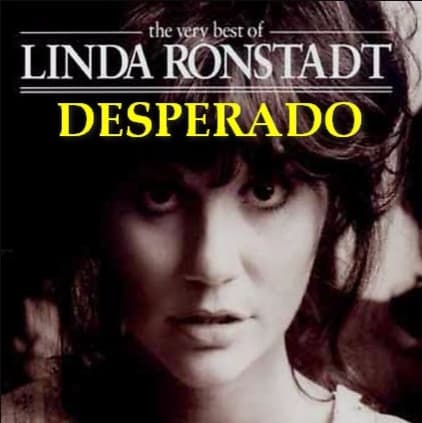
“Desperado”: A Melancholy Ode to the Lonely Heart and the Price of Unfettered Freedom
Ah, dear reader, cast your mind back to a time when the airwaves were imbued with melodies that spoke directly to the soul, when artists weren’t just singers but storytellers, weaving tapestries of emotion with every note. It was 1973, a pivotal year in the tapestry of American music, and from that rich period emerged a song that, while not a chart-topping single in its own right for its most famous interpreter, would nonetheless embed itself deeply in the collective consciousness: Linda Ronstadt‘s tender, aching rendition of “Desperado”.
While many associate the song with its original creators, the Eagles, who included it on their seminal 1973 album of the same name, it was Linda Ronstadt‘s exquisite interpretation on her album “Don’t Cry Now”, released in the fall of 1973, that truly brought the song’s profound sadness and vulnerability to light for many. Interestingly, for all its timeless appeal and enduring power, “Desperado” was never released as a single by the Eagles, who deemed it too much of a ballad for radio at the time. However, Linda Ronstadt‘s version did manage to make a modest showing on the charts, reaching No. 105 on the Cashbox Singles chart and spending seven weeks there. While not a massive hit in terms of raw chart numbers, its impact was far more profound, resonating deeply with listeners who found solace and understanding in its melancholic embrace.
The story behind “Desperado” is as compelling as the song itself, born from the fertile minds of Don Henley and Glenn Frey of the Eagles. The duo conceived the entire “Desperado” album as a concept piece, drawing parallels between the romanticized, yet often isolated, life of a Wild West outlaw and the struggles of a rock-and-roll musician in the burgeoning, often tumultuous music industry of the 1970s. The idea for the album’s theme reportedly sparked after a conversation with Jackson Browne and J.D. Souther, who had been inspired by a book about Old West gunfighters. The titular song, “Desperado,” became the very heart of this concept.
At its core, “Desperado” is a poignant plea to a lone individual, seemingly hardened by life and resistant to intimacy, to “come to your senses” before it’s “too late.” It paints a vivid picture of a “hard one,” someone who has been “out ridin’ fences for so long now,” guarding their heart and their independence with fierce determination. The lyrics delve into the inherent paradox of this self-imposed freedom: “Your prison is walking through this world all alone.” It’s a deeply reflective examination of the choices we make and the potential cost of prioritizing solitude over connection. The song uses rich metaphors, such as the “queen of diamonds” (representing worldly pleasures or material pursuits) versus the “queen of hearts” (symbolizing genuine love and emotional connection), to illustrate the protagonist’s misplaced desires. The poignant lines, “Don’t your feet get cold in the winter time? The sky won’t snow and the sun won’t shine. It’s hard to tell the night time from the day. You’re losin’ all your highs and lows. Ain’t it funny how the feeling goes away1?” beautifully capture the emotional desolation that comes with prolonged isolation.
Linda Ronstadt‘s rendition elevates this narrative to an almost ethereal level. Her voice, a instrument of unparalleled purity and emotive power, imbues every word with a heartbreaking vulnerability. When Don Henley sings it, there’s a sense of introspective wrestling, perhaps with his own demons. But when Linda Ronstadt sings it, it transforms into a compassionate lament, a tender yet firm appeal from one who sees the lonely path ahead for the “desperado.” It feels less like an internal monologue and more like a whispered truth from a friend, or perhaps, the very “queen of hearts” herself, longing for the unyielding spirit to finally open up. Her ability to convey such depth of emotion, without resorting to vocal histrionics, is a testament to her artistry. She found the quiet power in the song, the gentle ache that belies the bravado, making it feel intimately personal to countless listeners. It’s a song that, even after all these years, continues to resonate with anyone who has ever felt the sting of loneliness, the allure of independence, and the profound human need for connection. For those of us who grew up with these melodies as the soundtrack to our lives, Linda Ronstadt‘s “Desperado” remains a timeless reminder of the delicate balance between freedom and belonging, and the enduring power of a truly magnificent voice.